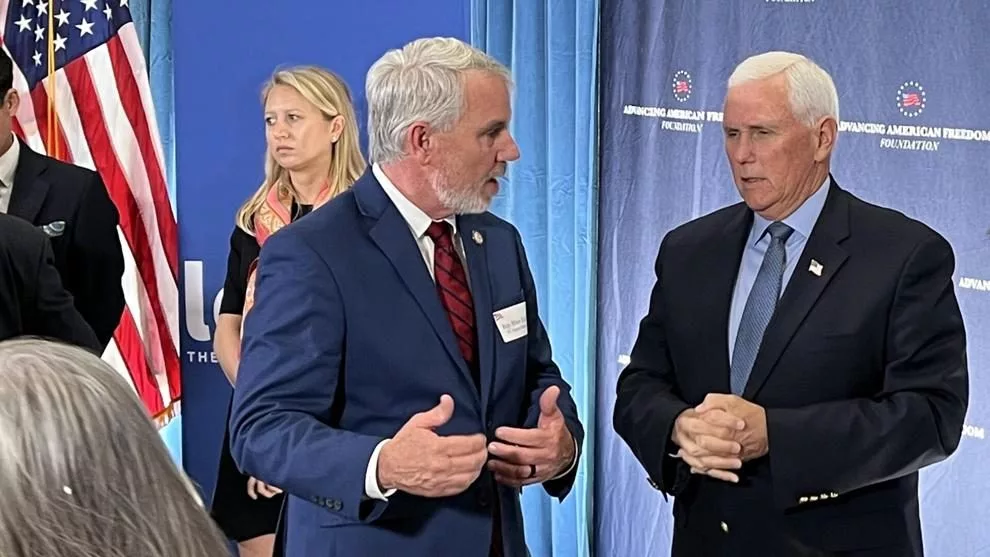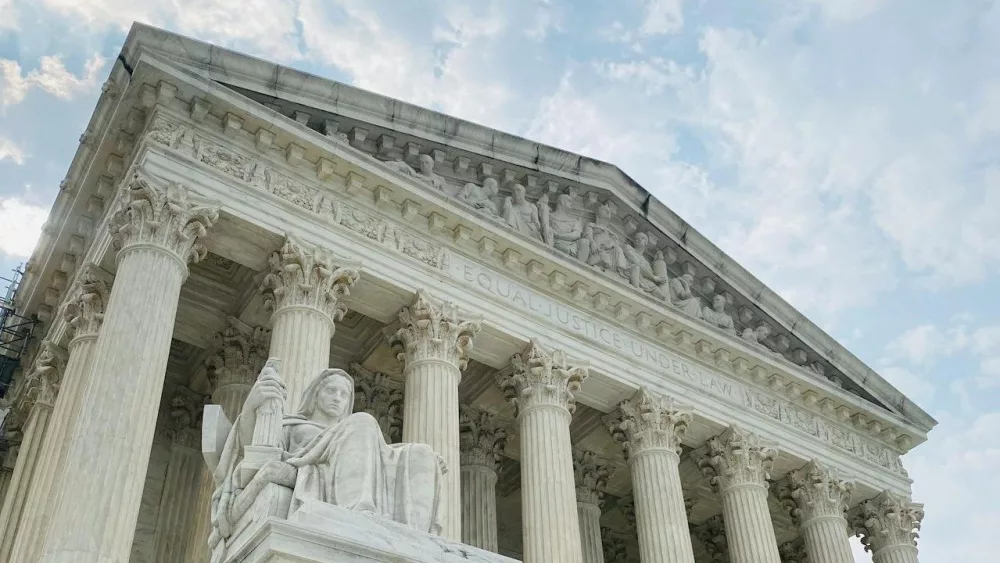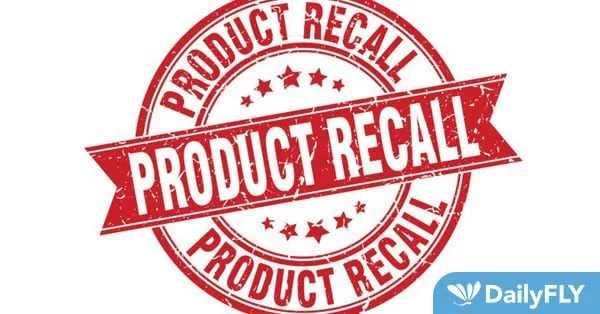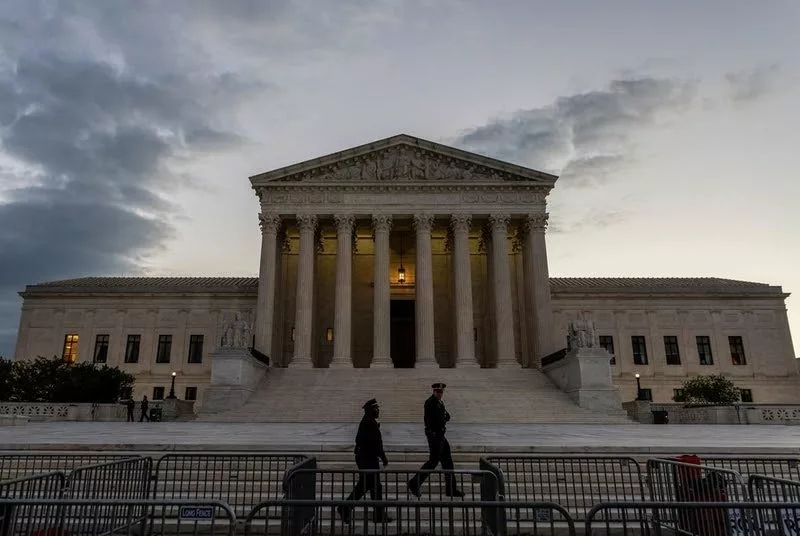WASHINGTON, D.C. – Regulations imposed, American consumers ultimately paying, and industry volatility are damaging impacts from across-the-board tariffs in a world economy where measures vary by country and product.
“The reason managed trade doesn’t work is no one is smart enough to manage it,” said H.O Woltz, president of Insteel Industries and a veteran of handling leverage with the Chinese for more than a quarter century of his nearly 50-year career.
The domino effect of ramifications, he and others said, can sometimes have an infinity.
He added later, “No government or government program has ever recognized that the key to the steel industry is having healthy consumers of steel. Customers go out of business because steel prices in the U.S. are too high relevant to the world market. Who are they going to sell to?
“I concede, China is different and needs to be dealt with a different way.”
Eight men representing multiple industries were led by former Vice President Mike Pence in a roundtable discussion in Raleigh on Monday morning. Pence said the goal was to ask questions on whether tariffs are good, who pays, and what will be the long-term consequences.
Pence is founder of the Advancing American Freedom Foundation and was joined from the organization by President Tim Chapman. It says it “promotes and defends the successful policies of recent years that yielded unprecedented prosperity at home and restored America’s strength abroad, while elevating traditional American values.”
An invited audience of about four dozen that included a number of state lawmakers also heard from H.O Woltz, president of Insteel Industries; Donald Bryson, CEO of the John Locke Foundation; Art Pope of Variety Wholesalers and chairman of the John William Pope Foundation; Bob Luddy, founder and president of CaptiveAire; Rodney Pitts, chairman of the board for the John Locke Foundation and owner of Southern Elevator; and Chris Chung from the Economic Development Partnership of North Carolina.
Woltz, Pence and others were respectful in tenor and expressed an understanding of “the why” behind President Donald Trump’s tariff trade wars. Impact from them varies, even to the tourism aspect that Chung and his group count among their three primary focuses. Pitts, for example, said his industry is almost but not entirely insulated from the tariff war with China.
The industries of Woltz and Luddy were different.
The last audience question dealt with the simplicity of how it all meshes, for the good of Americans and in his case North Carolinians. Rep. Blair Eddins, R-Wilkes, said his job wasn’t to act on tariffs but simply to answer for them.
And it’s not easy.
North Carolina’s economy ranks No. 32 in the world, with more than $1.1 billion and 88,000 jobs tied to its ports. The state and nation’s way of counting positively, however, doesn’t equal all other countries where sometimes there are significant subsidies from the government. For example, count China in that group.
Thus, as Chapman said, even an equal percentage tariff can be a trade deficit.
Volatility in supply chains is real and a major concern. Pitts assured his company will make “zero” investments when the market is unstable, and Luddy gave the example of his company getting sourced equipment from Italy, France and China. The motors from China are “almost invincible,” he said.
“If we were to make changes to those components, it would cause a major disruption,” Luddy said.
Bryson said reducing input costs is the way for the Trump administration to help the American economy. And Pope said, even if believing in tariffs, it should be done by congressional action rather than executive. He cited alongside that the uproar from conservatives when former Democratic President Joe Biden wanted to unilaterally wipe out student loans, leading to litigation.
All the panelists agreed China is different than other countries, though there was never a recognition that the means to the place America is in – a 90-day pause after tariffs soared to 145% on Chinese imports – was the best route.
“There is a belief that this does help the American economy,” Pence said of tariffs in general. “It’s going to affect employment. You can raise prices but only to a certain extent. It’s also going to affect the workforce and jobs.”
Pope’s company in December acquired about 200 stores through the bankruptcy proceedings of Big Lots. He invested even in knowledge and belief tariff increases could be coming.
“We never thought it would be this high,” he told The Center Square afterward.
Pope said his industry typically would have orders in for the Christmas season by now, about six months ahead of the sales season. Instead, there’s a waiting game for he and his competitors, unsure of tariffs and what consumers will both be able to purchase in discretionary income and how much it will cost them.
“President Trump,” he said, “may wind up being the Grinch that stole Christmas.”
Woltz leads America’s largest manufacturer of steel wire reinforcing products for concrete construction applications from the corporate office in Mount Airy. China, he said, is different for a host of reasons.
“China and the steel industry is responsible for the sad state of affairs that exist in the steel industry worldwide,” he said. “China exports more steel than the entire size of the U.S. market. They export it at ever lower prices. Those companies aren’t forced to make a profit. There is no price that is too low.
“For 10 years, we’ve tried to find an answer. But every country went its own way.”
Pence reminded that tax authority belongs to Congress, even though over many decades it has “been divesting steadily to the executive branch.” Luddy and Pitts emphasized less regulation is best and assured that tariffs are a form of regulation.
Luddy, in fact, drew chuckles from the serious humor that his engineers are “not very political people at all” and yet are quite mad with the government and its long arms of regulation.
“We’re all on the same team,” Pence said. “Protectionist policies are not the answer.”
Pence said the location choice of his nonprofit’s first roundtable was strategic, citing North Carolina’s “always” outsized role in shaping leadership of the Republican Party. Partnering with the John Locke Foundation for the discussion was harmonious in conservative principles and finding where the Grand Old Party’s increasing division will come to rest.
Bryson said it’s challenging.
“The Trump administration is forcing certain conservative groups to walk and chew gum at the same time,” he deadpanned with reference to those promoting free markets and small governments. He described the conservative side, as generally defined, in process of a splintering he hopes ceases.
And the corporate leaders, more than once, affirmed that the cost to Americans on tariffs had yet to hit. Companies have written checks by the millions to the U.S. Treasury, but it will be a few more months before the costs show up on shelves.
“Free trade with free people is what we believe in,” Bryson said. “Corporations don’t pay taxes. They pass costs to consumers.”





